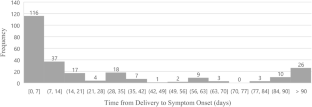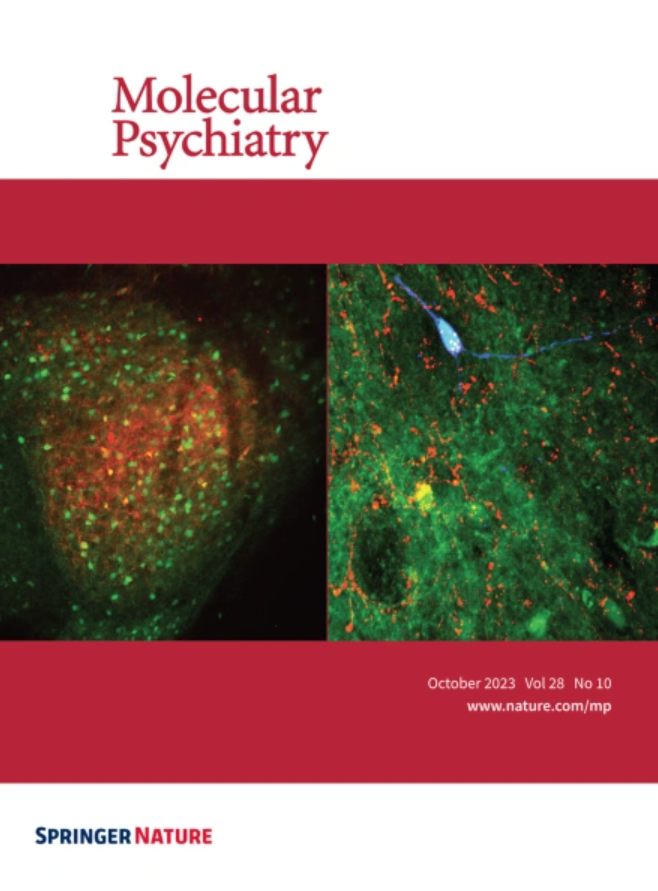The phenomenology of postpartum psychosis: preliminary findings from the Massachusetts General Hospital Postpartum Psychosis Project
Lee S. Cohen, Miranda Arakelian, Taylor R. Church, Madison M. Dunk, Margaret L. Gaw, Hannah E. Yoon, Lauren A. Kobylski, Rachel Vanderkruik, Marlene P. Freeman
求助PDF
{"title":"The phenomenology of postpartum psychosis: preliminary findings from the Massachusetts General Hospital Postpartum Psychosis Project","authors":"Lee S. Cohen, Miranda Arakelian, Taylor R. Church, Madison M. Dunk, Margaret L. Gaw, Hannah E. Yoon, Lauren A. Kobylski, Rachel Vanderkruik, Marlene P. Freeman","doi":"10.1038/s41380-024-02856-3","DOIUrl":null,"url":null,"abstract":"<p>Postpartum psychosis (PP) is a severe psychiatric disorder–with limited data or consensus on diagnostic criteria and clinical presentation–that affects thousands of people each year. The Massachusetts General Hospital Postpartum Psychosis Project (MGHP3) was established to: 1) describe the phenomenology of PP, and 2) identify genomic and clinical predictors in a large cohort. Results thus far point to a richer understanding of the heterogeneity and complexity of this often-misunderstood illness and its nature over time. Data are collected from those who experienced PP within 6 months of delivery and within the 10 years prior to the MGHP3 interview. Participants provide information via the Mini International Neuropsychiatric Interview for Psychotic Disorders Studies (MINI-PDS), MGHP3© Questionnaire (including assessment of episode onset, duration, symptoms, and treatment received), and other relevant history. This retrospective study uses validated diagnostic tools to evaluate psychiatric history across participants’ lifetimes. Descriptive statistics (e.g., median values, frequencies) were conducted to describe the phenomenology of PP. As of November 3, 2022, 248 participants with histories of at least one episode of PP completed the MGHP3 interview. Most participants met criteria for Bipolar I Disorder with psychotic features (71.8%). During PP episode(s), participants reported odd beliefs or delusions (87.6%), persecutory delusions (75.2%), ideas of reference (55.8%), and visual (52.3%) and/or auditory (48.1%) hallucinations. The median time between delivery and symptom onset was 10 days (SD = 43.72). Most participants reported receiving medication (93.0%) and/or psychotherapy (65.9%). This report describes findings regarding the phenomenology of postpartum psychosis among the MGHP3 cohort, the largest cohort with validated PP studied to date. This ongoing effort to refine the phenotype of PP and to delineate underlying genetic determinants of the disorder will contribute to an enhanced understanding of this serious illness. It also underscores areas for further rigorous assessment using other research methods and sets the stage for translational reproductive neuroscience – including ongoing analyses of neuroimaging and genetic data from the MGHP3 cohort.</p>","PeriodicalId":19008,"journal":{"name":"Molecular Psychiatry","volume":"75 1","pages":""},"PeriodicalIF":9.6000,"publicationDate":"2024-12-06","publicationTypes":"Journal Article","fieldsOfStudy":null,"isOpenAccess":false,"openAccessPdf":"","citationCount":"0","resultStr":null,"platform":"Semanticscholar","paperid":null,"PeriodicalName":"Molecular Psychiatry","FirstCategoryId":"3","ListUrlMain":"https://doi.org/10.1038/s41380-024-02856-3","RegionNum":1,"RegionCategory":"医学","ArticlePicture":[],"TitleCN":null,"AbstractTextCN":null,"PMCID":null,"EPubDate":"","PubModel":"","JCR":"Q1","JCRName":"BIOCHEMISTRY & MOLECULAR BIOLOGY","Score":null,"Total":0}
引用次数: 0
引用
批量引用
Abstract
Postpartum psychosis (PP) is a severe psychiatric disorder–with limited data or consensus on diagnostic criteria and clinical presentation–that affects thousands of people each year. The Massachusetts General Hospital Postpartum Psychosis Project (MGHP3) was established to: 1) describe the phenomenology of PP, and 2) identify genomic and clinical predictors in a large cohort. Results thus far point to a richer understanding of the heterogeneity and complexity of this often-misunderstood illness and its nature over time. Data are collected from those who experienced PP within 6 months of delivery and within the 10 years prior to the MGHP3 interview. Participants provide information via the Mini International Neuropsychiatric Interview for Psychotic Disorders Studies (MINI-PDS), MGHP3© Questionnaire (including assessment of episode onset, duration, symptoms, and treatment received), and other relevant history. This retrospective study uses validated diagnostic tools to evaluate psychiatric history across participants’ lifetimes. Descriptive statistics (e.g., median values, frequencies) were conducted to describe the phenomenology of PP. As of November 3, 2022, 248 participants with histories of at least one episode of PP completed the MGHP3 interview. Most participants met criteria for Bipolar I Disorder with psychotic features (71.8%). During PP episode(s), participants reported odd beliefs or delusions (87.6%), persecutory delusions (75.2%), ideas of reference (55.8%), and visual (52.3%) and/or auditory (48.1%) hallucinations. The median time between delivery and symptom onset was 10 days (SD = 43.72). Most participants reported receiving medication (93.0%) and/or psychotherapy (65.9%). This report describes findings regarding the phenomenology of postpartum psychosis among the MGHP3 cohort, the largest cohort with validated PP studied to date. This ongoing effort to refine the phenotype of PP and to delineate underlying genetic determinants of the disorder will contribute to an enhanced understanding of this serious illness. It also underscores areas for further rigorous assessment using other research methods and sets the stage for translational reproductive neuroscience – including ongoing analyses of neuroimaging and genetic data from the MGHP3 cohort.
产后精神病的现象学:马萨诸塞州总医院产后精神病项目的初步发现
产后精神病(PP)是一种严重的精神疾病,在诊断标准和临床表现上的数据或共识有限,每年影响数千人。马萨诸塞州总医院产后精神病项目(MGHP3)的建立是为了:1)描述产后精神病的现象学,2)在一个大队列中确定基因组和临床预测因子。迄今为止的结果表明,人们对这种经常被误解的疾病的异质性和复杂性及其随时间推移的性质有了更丰富的了解。数据收集自分娩后6个月内和MGHP3访谈前10年内经历过PP的患者。参与者通过精神障碍研究迷你国际神经精神病学访谈(Mini - pds)、MGHP3©问卷(包括对发作、持续时间、症状和接受治疗的评估)和其他相关病史提供信息。本回顾性研究使用经过验证的诊断工具来评估参与者一生的精神病史。描述性统计(例如,中位数,频率)用于描述PP的现象学。截至2022年11月3日,248名至少有一次PP病史的参与者完成了MGHP3访谈。大多数参与者符合伴有精神病特征的双相I型障碍的标准(71.8%)。在PP发作期间,参与者报告了奇怪的信念或妄想(87.6%),受迫害的妄想(75.2%),参照的想法(55.8%),视觉(52.3%)和/或听觉(48.1%)幻觉。分娩至出现症状的中位时间为10 d (SD = 43.72)。大多数参与者报告接受药物治疗(93.0%)和/或心理治疗(65.9%)。本报告描述了MGHP3队列中产后精神病现象学的研究结果,MGHP3队列是迄今为止研究的最大的验证PP队列。这项正在进行的努力,旨在完善PP的表型,并描述该疾病的潜在遗传决定因素,将有助于加强对这种严重疾病的了解。它还强调了使用其他研究方法进行进一步严格评估的领域,并为转化生殖神经科学奠定了基础——包括对来自MGHP3队列的神经成像和遗传数据的持续分析。
本文章由计算机程序翻译,如有差异,请以英文原文为准。



